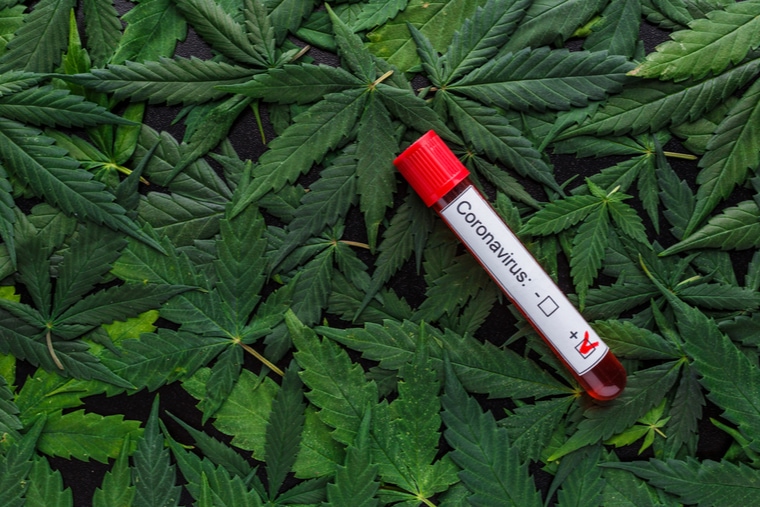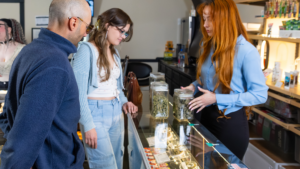Two groundbreaking new preliminary studies have found that not one, not two, but three cannabinoids may block the original, live SARS-CoV-2 virus. The evidence suggests that the cannabis compounds can lessen the severity of COVID-19 infection in both human cells and mice. We break down the findings here.
Research published in the Journal of Natural Products found that two cannabinoids, cannabidiolic acid (CBDA) and cannabigerolic acid (CBGA), prevented the entry of the coronavirus into isolated human cells. They were both confirmed to block the original, live virus and two variants of concern: alpha and beta. An approach known as MagMass was used to screen which hemp extracts may bind to the SARS-CoV-2 spike protein.
CBDA administered orally to human volunteers at 0.063 mg/kg showed greater bioavailability than CBD. In beagle dogs, oral administration of CBDA at 1 mg/kg was well tolerated and was 2-fold more bioavailable than CBD. Although no data on the bioavailability of CBGA are yet available, the data for CBDA suggest that concentrations for CBGA should also be possible.
Researchers conclude by stating, “With widespread use of cannabinoids, resistant variants could still arise, but the combination of vaccination and CBDA/CBGA treatment should create a more challenging environment with which SARS-CoV-2 must contend, reducing the likelihood of escape.”
Newer findings published in Science Advances treated human cells and mice with cannabidiol (CBD), and found that the cannabinoid can prevent the virus from replicating in human cells after entering those cells. Specifically, CBD activates our system to respond to the pathogens, working on human cells after the virus enters, a telling sign for the potential of CBD as an early response agent.
To test the effect of CBD on SARS-CoV-2 replication, human lung carcinoma cells were pretreated for 2 hours with 0–10 μM CBD prior to infection with SARS-CoV-2. After 48 hours, cells were monitored for expression of the viral spike protein and viral titer. CBD potently inhibited viral replication under non-toxic conditions, as well as inhibited SARS-CoV-2 replication in human lung and monkey kidney epithelial cells. No toxicity was observed at the effective doses. In addition to the original SARS-CoV-2 strain three variants were tested as well, alpha (α), beta (β), and gamma (γ), and their ability to infect cells was comparably inhibited by CBD.
Additionally, the study composed an analysis of more than 1,000 individuals using CBD for the treatment of epilepsy and found the patients tested positive for COVID-19 at lower rates than patients who were not administering CBD treatment.
Martha Rosner, senior author of the Science Advances study explains, “We should think of this as another tool in our arsenal. We imagine if we find it works in clinical trial, it might be useful for breakthrough infections.”
So, what does all of this mean for cannabis users? The findings are certainly positive, but shouldn’t be viewed as a substitute for vaccines or other guidelines suggested by the CDC. Unfortunately, there has been no research that shows inhaling cannabis or THC has any positive effect against COVID-19 either. And while it may be tempting to run out and buy the nearest over-the-counter CBD, researchers are stressing the importance of using high-quality, high-purity CBD options, like those available from our supported brands.
Disclaimer
The Realm of Caring Foundation specifically invokes the first amendment rights of freedom of speech and of the press without prejudice. These statements have not been evaluated by the food and drug administration. The products discussed are not intended to diagnose, cure, prevent or treat any disease. Realm of Caring always recommends when and wherever possible that licensed local healthcare professionals be consulted.
The Realm of Caring Foundation is an independent nonprofit with its own governing board. We do not produce or sell cannabinoid products, nor do we receive funds from the sale of other company’s products.






